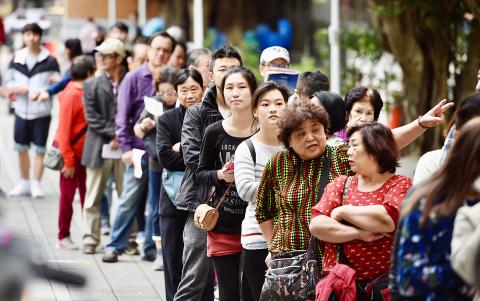Taiwanese voted in 10 referendums alongside yesterday’s nine-in-one local elections — the greatest number of referendums held simultaneously since the plebiscite mechanism was implemented in 2004.
The referendums covered a broad range of issues, including the definition of marriage in the Civil Code, the ban on food imports from five Japanese prefectures imposed after the Fukushima Dai-ichi nuclear power plant disaster in 2011 and changing the national team’s name from “Chinese Taipei” to “Taiwan” for the 2020 Tokyo Olympic Games.
A total of 19,757,067 people were eligible to vote on yesterday’s referendums, the Central Election Commission (CEC) said.

Photo: Liao Chen-huei, Taipei Times
Amendments to the Referendum Act (公民投票法) in December last year lowered the threshold needed to pass a referendum.
Yesterday, at least one-quarter of the eligible voters — or 4,939,267 votes — needed to be in favor of a referendum, with the “yes” votes outnumbering the “no” votes, for a referendum to pass.
Results of the 10 referendums were not available at press time last night.
The CEC on Friday said it hoped to finish counting all the referendum ballots by midnight yesterday, meaning that the results could be announced by 2am today.
By law, referendum results must be made public within seven days, CEC Vice Chairman Chen Chao-chien (陳朝建) said.
Under the Referendum Act, a law repealed in a referendum would be rescinded three days after the result is officially announced by the commission, Chen said.
A result that calls for new legislation would require the government to submit a proposed bill no later than three months after the vote and the Legislative Yuan to complete a review before the next summer or winter break, the act says.
A result that calls for a change in policy would require the president or relevant authority to take steps to implement the change, the act says.
The referendum sponsor can apply to the Council of Grand Justices for an interpretation if they feel that the authorities have not handled the matter properly, Chen added.
A referendum that does not pass is not legally binding and no referendum can be launched on the same topic for two years, Chen said.
Prior to yesterday’s vote, the CEC made public the Executive Yuan’s opinions regarding the 10 referendums.
The Executive Yuan maintains that if the referendum passes, the government should respect the results calling for the name of the national team participating in the 2020 Tokyo Olympic Games to be changed from “Chinese Taipei” to “Taiwan.”
If the referendum passes, the Chinese Taipei Olympic Committee would be tasked with filing applications with the International Olympic Committee, moving forward on the assumption that the nation’s Olympic membership remains valid and that Taiwanese athletes can still represent Taiwan at the Games, the Executive Yuan said.
The Executive Yuan maintains that enough thermal power plants would need to remain operational to ensure stable power output even if the referendum proposed by Chinese Nationalist Party (KMT) Legislator Lu Shiow-yen (盧秀燕) passed.
It called for power output from thermal power plants be lowered by 1 percent annually.

AIR SUPPORT: The Ministry of National Defense thanked the US for the delivery, adding that it was an indicator of the White House’s commitment to the Taiwan Relations Act Deputy Minister of National Defense Po Horng-huei (柏鴻輝) and Representative to the US Alexander Yui on Friday attended a delivery ceremony for the first of Taiwan’s long-awaited 66 F-16C/D Block 70 jets at a Lockheed Martin Corp factory in Greenville, South Carolina. “We are so proud to be the global home of the F-16 and to support Taiwan’s air defense capabilities,” US Representative William Timmons wrote on X, alongside a photograph of Taiwanese and US officials at the event. The F-16C/D Block 70 jets Taiwan ordered have the same capabilities as aircraft that had been upgraded to F-16Vs. The batch of Lockheed Martin

US President Donald Trump yesterday announced sweeping "reciprocal tariffs" on US trading partners, including a 32 percent tax on goods from Taiwan that is set to take effect on Wednesday. At a Rose Garden event, Trump declared a 10 percent baseline tax on imports from all countries, with the White House saying it would take effect on Saturday. Countries with larger trade surpluses with the US would face higher duties beginning on Wednesday, including Taiwan (32 percent), China (34 percent), Japan (24 percent), South Korea (25 percent), Vietnam (46 percent) and Thailand (36 percent). Canada and Mexico, the two largest US trading

GRIDLOCK: The National Fire Agency’s Special Search and Rescue team is on standby to travel to the countries to help out with the rescue effort A powerful earthquake rocked Myanmar and neighboring Thailand yesterday, killing at least three people in Bangkok and burying dozens when a high-rise building under construction collapsed. Footage shared on social media from Myanmar’s second-largest city showed widespread destruction, raising fears that many were trapped under the rubble or killed. The magnitude 7.7 earthquake, with an epicenter near Mandalay in Myanmar, struck at midday and was followed by a strong magnitude 6.4 aftershock. The extent of death, injury and destruction — especially in Myanmar, which is embroiled in a civil war and where information is tightly controlled at the best of times —

China's military today said it began joint army, navy and rocket force exercises around Taiwan to "serve as a stern warning and powerful deterrent against Taiwanese independence," calling President William Lai (賴清德) a "parasite." The exercises come after Lai called Beijing a "foreign hostile force" last month. More than 10 Chinese military ships approached close to Taiwan's 24 nautical mile (44.4km) contiguous zone this morning and Taiwan sent its own warships to respond, two senior Taiwanese officials said. Taiwan has not yet detected any live fire by the Chinese military so far, one of the officials said. The drills took place after US Secretary